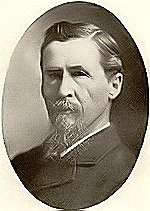Introduction
Born: 1841, Fleming County, Kentucky.
Died: August 15, 1921, Coffeyville, Kansas.
Buried: Fairview Cemetery, Coffeyville, Kansas.

Born: 1841, Fleming County, Kentucky.
Died: August 15, 1921, Coffeyville, Kansas.
Buried: Fairview Cemetery, Coffeyville, Kansas.

James was the son of Samuel Painter and Nancy Jane VanKirk. He married twice: to Catherine Kate
Brock (July 8, 1864) and Nancy R. Wade (October 10, 1897, Hancock County, Illinois).
J. H. Painter was born in Fleming County, Kentucky, in the year 1841, and was brought up in Warren and McDonough Counties, Illinois, from 1844 until 1861, when he enlisted in the army and served three years.
After this service he remained in Tennessee, joined the Methodist Episcopal Church, and was licensed to exhort, then to preach. In 1866 he removed to Cass County, Missouri, where he became identified with the Disciples, under the ministry of M. D. Todd, and began preaching for them in 1868.
Later he removed to Kansas, where he was quite active and successful in the ministry until 1875, when he returned to the locality in Illinois where he was brought up, and established a church, baptizing a number of his kinsmen and others, around whose knees he had played in youth. That church still exists.
In 1876—Christmas Day—he landed in Iowa, where his ministerial labors have been chiefly wrought. Howbeit, he has held meetings since then in Kansas, Missouri, Illinois, the Dakotas and Nebraska.
He was State evangelist in Iowa for twelve years and organized nearly one hundred of her churches, besides assisting, more or less, all the others. At one time he personally knew every preacher, and the condition of every church, in the State, even when the former numbered nearly two hundred, and the latter nearly twice as many.
Most of this time he was on the editorial staff of the Christian Oracle, hardly ever missing an issue in which his busy pen did not enrich its columns, to the delight of its readers. It was a common remark of its readers: I read every word he writes, first.
Sometimes his criticisms were quite severe, and almost raised the cuticle on somebody. Once or twice a complaint was made to the editor that the complainer didn’t like Painter’s writing. The editor told them to skip it then; that there were many others who did like it. Then the answer came back: We do not want to skip it; we never fail to read every word he writes, even if we have to skip something else.
Of course the editor replied that his paper was printed for the purpose of being read, and therefore this writer must be a success.
Bro. Painter has been a most untiring worker during all the years of his ministry. He was never idle. Iowa owes more to him for the present condition of the church within her borders than to perhaps any other man in the State. Patient under difficulties, wise in counsel, earnest and Scriptural in the pulpit, and a most genial fireside companion. No one was a more welcome visitor at my home. Everybody loved him, even those whom he severely criticised.
The subject of this sketch has a remarkably clear conception of apostolic Christianity, and can express it in great plainness of speech.
You may not agree with him, but you will not misunderstand him. He never uses two words when one will express his meaning.
His converts—and they are many—generally know what they believe, and can give a reason for the hope that is in them.
The lines between Judaism and Christianity, and between apostolic Christianity and modern denominationalism, yea, between the gospel of Christ and all other systems, exist in his mind as clear as light, and hence he is no compromiser with any rival concern of the gospel.
He has written several tracts, and conducted two or three written and one oral discussion.
After resigning as State evangelist, he accepted the position of field agent for the Standard Publishing Company, but at the end of two years resigned, and preached two years for the Bondurant and Rising Sun Churches, near Des Moines, Iowa, putting them on the high road to a fine success.
He is now living at Eddyville, Iowa, somewhat retired, preaching three-fourths of his time, and exercising a little
on a small home of eight acres. He has recently brought out a small volume of three hundred pages, Reminiscences and Notes;
is married to his second wife; has four children, but none are with him, having families of their own. He is five feet six inches in height; weighs 135 pounds; has brown hair and eyes, and looks younger than he is.
Twentieth Century Sermons and Addresses, by Louis C. Wilson, ed. (Cincinnati, Ohio: Standard Publishing, 1902), pp. 201–02